
Cannabis Education Program Spotlight: How They Benefit Individuals and Communities
Discover the transformative impact of cannabis education programs on individuals and communities. Learn how evidence-based courses can foster responsible use, dispel myths, and improve public health.
In this article:
Court-Ordered Cannabis Courses and Community Impact
Components of Effective Cannabis Education Programs
Understanding THC and CBD
The Endocannabinoid System
Effects of THC and Other Cannabinoids
Dispelling Misconceptions and Myths
Promoting Responsible Use and Harm Reduction
The Far-Reaching Benefits of Cannabis Education
The Importance of Prioritizing Cannabis Education
The growing need for cannabis education has become increasingly apparent as more states legalize THC-containing cannabis, or marijuana, for medical and recreational use. Comprehensive and evidence-based cannabis education programs play a crucial role in promoting responsible cannabis use and mitigating the negative consequences associated with misuse.
Court-Ordered Cannabis Courses and Community Impact
Court-ordered cannabis education courses not only benefit individuals by providing essential information and guidance but also contribute to the well-being of the communities in which they operate. By supporting local initiatives, programs like ours foster a healthier relationship between legal systems, public health efforts, and individuals who use cannabis.
Components of Effective Cannabis Education Programs
Effective cannabis education programs cover various components to ensure participants gain a comprehensive understanding of cannabis and its effects. Some of these components include the modern science of cannabis, the distinction between THC and CBD, and the endocannabinoid system.
Understanding THC and CBD
The distinction between THC and CBD is essential for individuals to understand. CBD, or cannabidiol, is another prominent cannabinoid found in cannabis, known for its potential therapeutic effects without the psychoactive properties of THC. Educating individuals about the differences between THC and CBD can help them select cannabis products that align with their needs and preferences.
The Endocannabinoid System
The endocannabinoid system is a complex cell-signaling network within the human body that plays a crucial role in maintaining homeostasis or balance. By understanding this system, individuals can better comprehend how cannabis interacts with the body and the potential effects of cannabinoids like THC and CBD.
Effects of THC and Other Cannabinoids
THC, or delta-9-tetrahydrocannabinol, is the primary psychoactive compound found in cannabis. It interacts with cannabinoid receptors in the brain, producing the well-known "high" associated with marijuana use. However, THC may also cause undesirable side effects, such as impaired memory, increased anxiety, and altered perception. Gaining knowledge about the effects of THC and other cannabinoids empowers individuals to make informed decisions regarding their cannabis use.
Dispelling Misconceptions and Myths
Dispelling misconceptions and myths about cannabis use is a fundamental aspect of these education programs. By debunking common misunderstandings, these courses foster an accurate, evidence-based understanding of cannabis and its effects. This includes addressing the belief that cannabis is not addictive or that it can serve as a gateway drug, leading to the use of more dangerous substances.
Promoting Responsible Use and Harm Reduction
Responsible use and harm reduction are also vital components of effective cannabis education courses. By teaching individuals to recognize the signs of abuse or addiction and providing resources for seeking help when needed, these programs can promote responsible cannabis consumption and minimize potential harm.
The Far-Reaching Benefits of Cannabis Education
The advantages of cannabis education courses reverberate beyond individuals, significantly impacting entire communities. For individuals, these courses foster improved decision-making, increased awareness of legal and workplace implications, and the cultivation of a healthier relationship with cannabis. In doing so, they help to alleviate pressure on public health and safety systems, nurture a more informed and responsible society, and reinforce local initiatives and community programs.
The Importance of Prioritizing Cannabis Education
In conclusion, it's crucial to prioritize cannabis education as an integral part of a comprehensive approach to public health and safety. By encouraging people to seek out evidence-based, court-ordered cannabis education courses, we can pave the way for positive change in individuals and communities through the power of effective cannabis education programs.
Page last updated: March 15th, 2023

OUR COURSES
Drag to resize

Project Bono provides the most affordable up-to-date online classes that fulfill court and employer mandates while contributing 25% of proceeds towards charitable causes.
SOCIAL LINKS
RESOURCES
-
About Us
-
Print a Referral
-
Example Certificate
-
Where We're Accepted
Drag to resize
SUPPORT
Drag to resize


Copyright © 2024 Project Bono. All Rights Reserved
Money-Back Guarantee
All of our courses are backed by a 30-day money-back guarantee. If your certificate of completion is not accepted, contact us with proof of decline.
We recommend you confirm that your assigner will accept our certificates before you enroll in any of our courses.
Note: Cryptocurrency payments do not qualify at this time.
We recommend you confirm that your assigner will accept our certificates before you enroll in any of our courses.
Note: Cryptocurrency payments do not qualify at this time.
Drugs & Alcohol
MIP
Anger
Truancy
Cannabis
Bullying
Theft
Nicotine
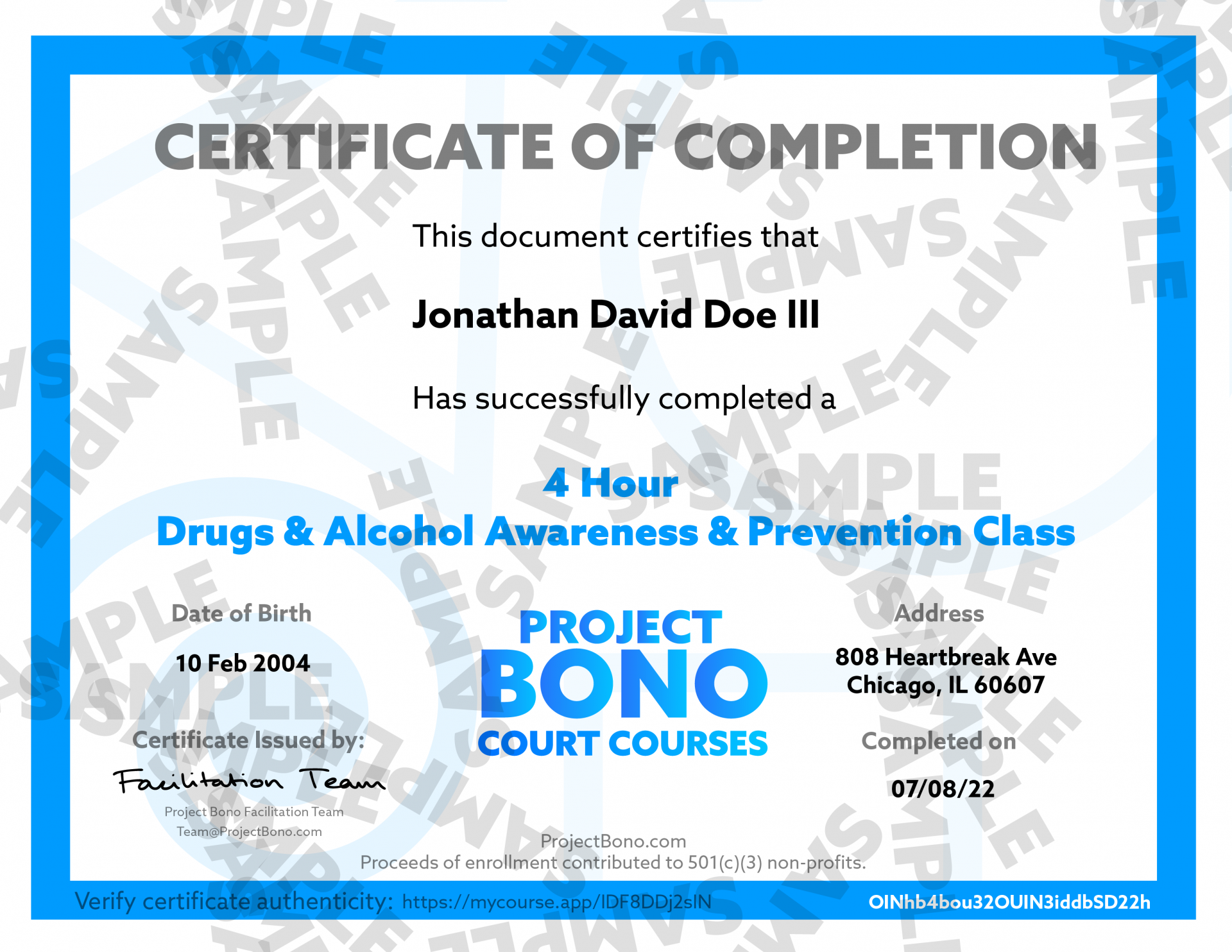
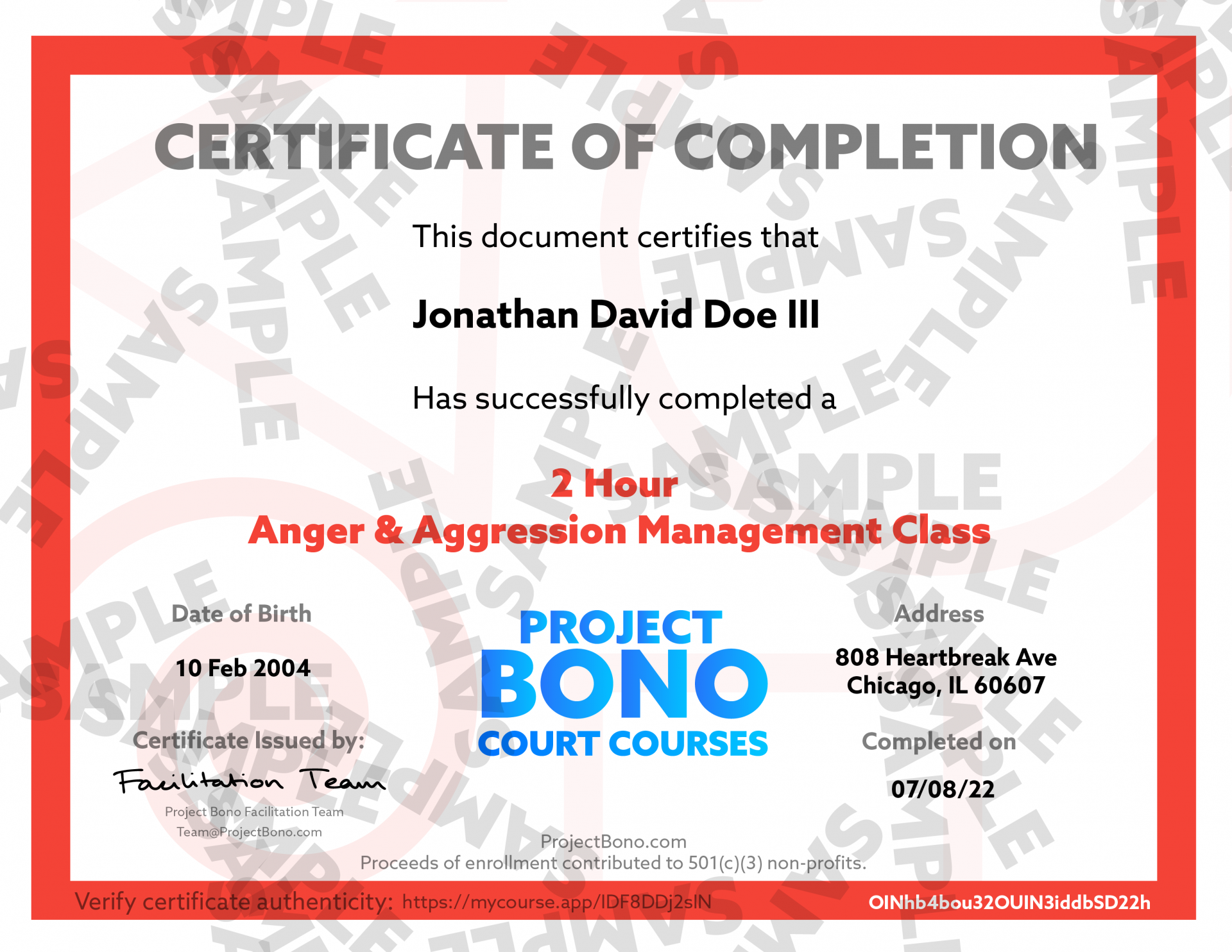
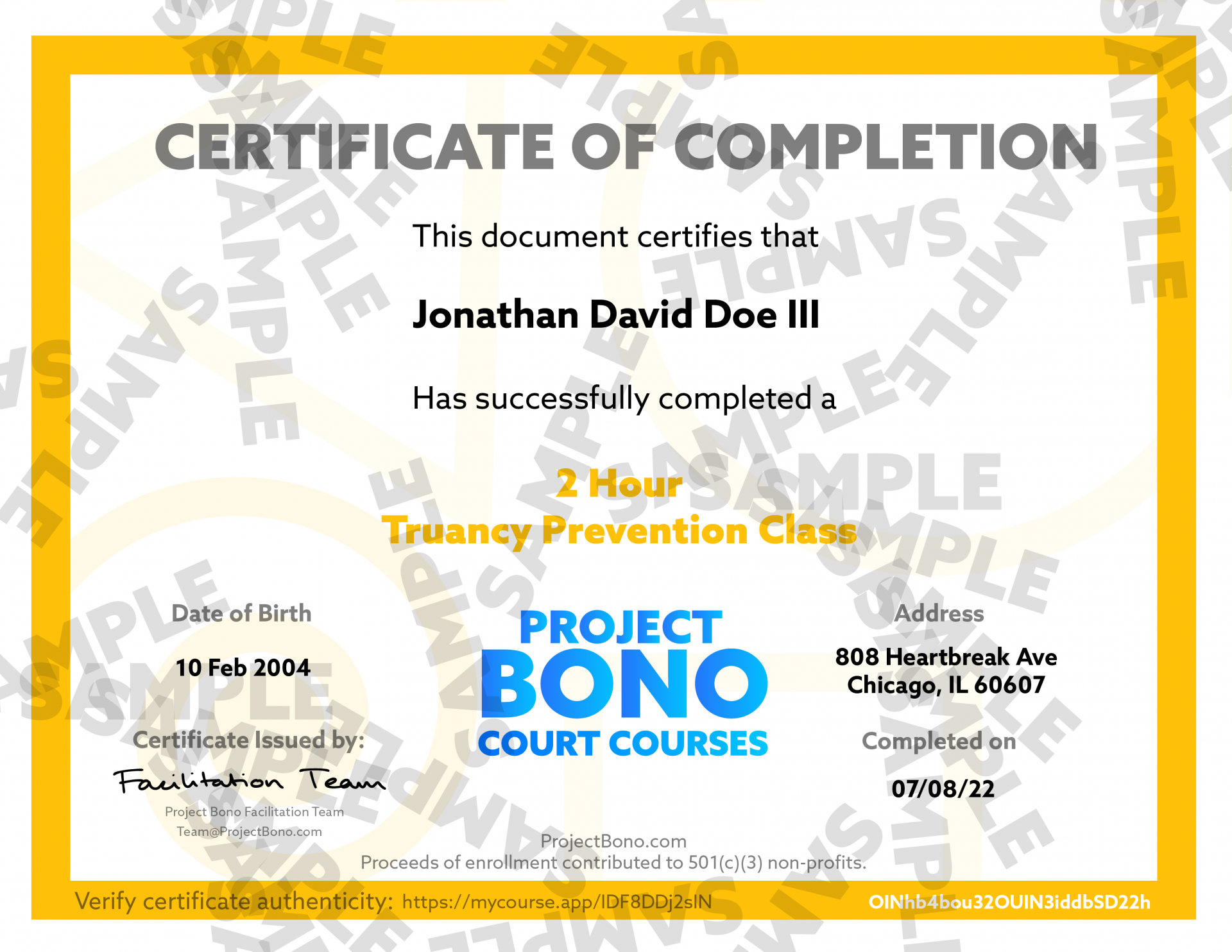
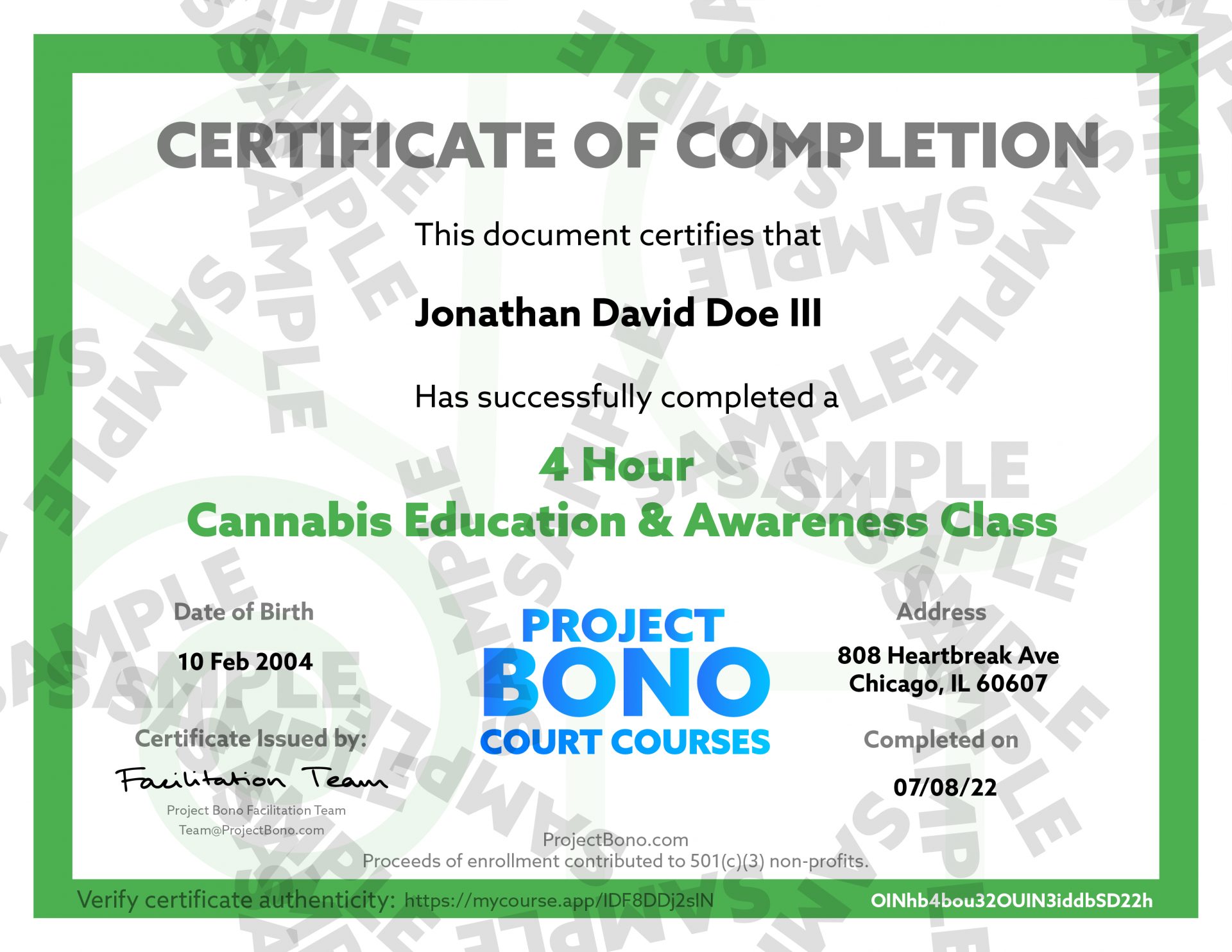
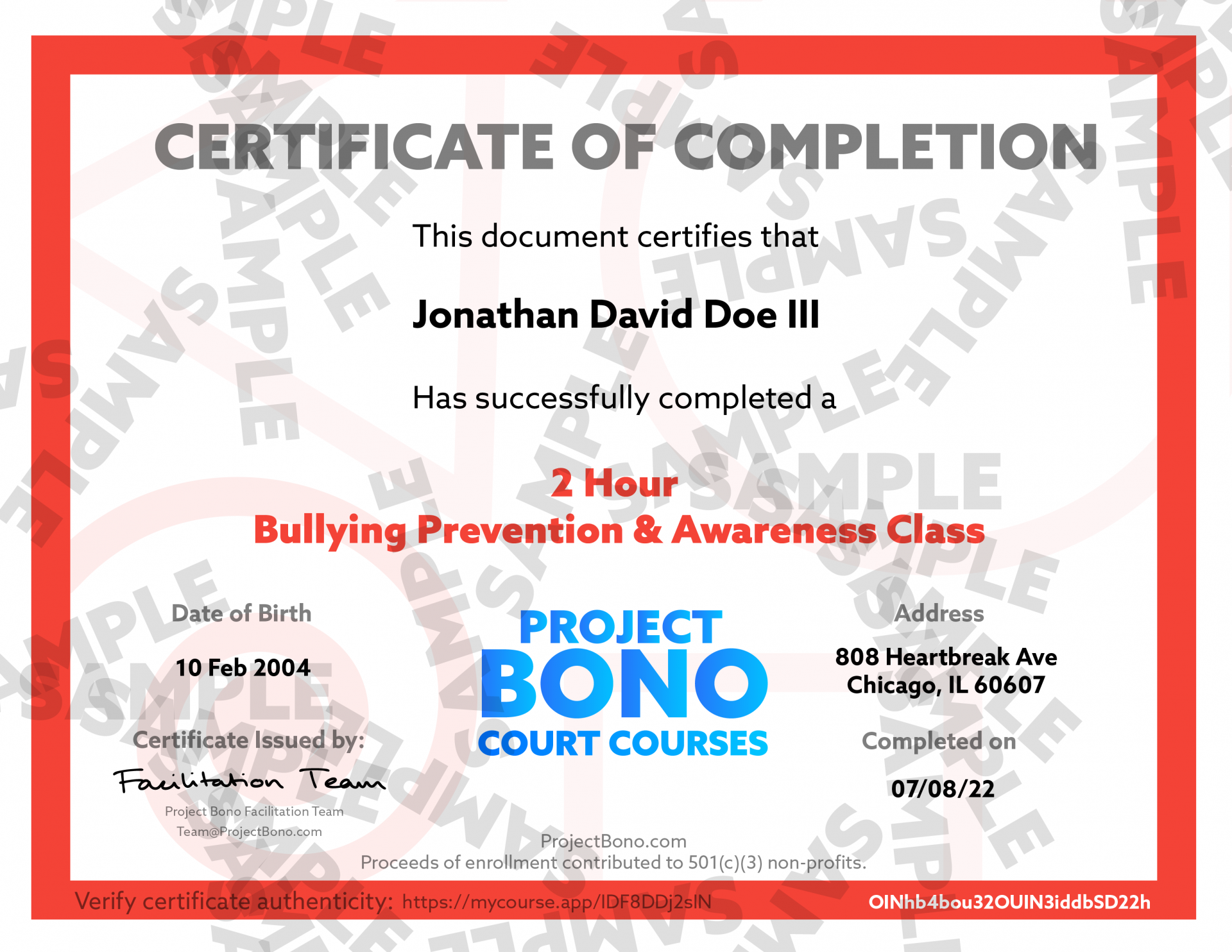
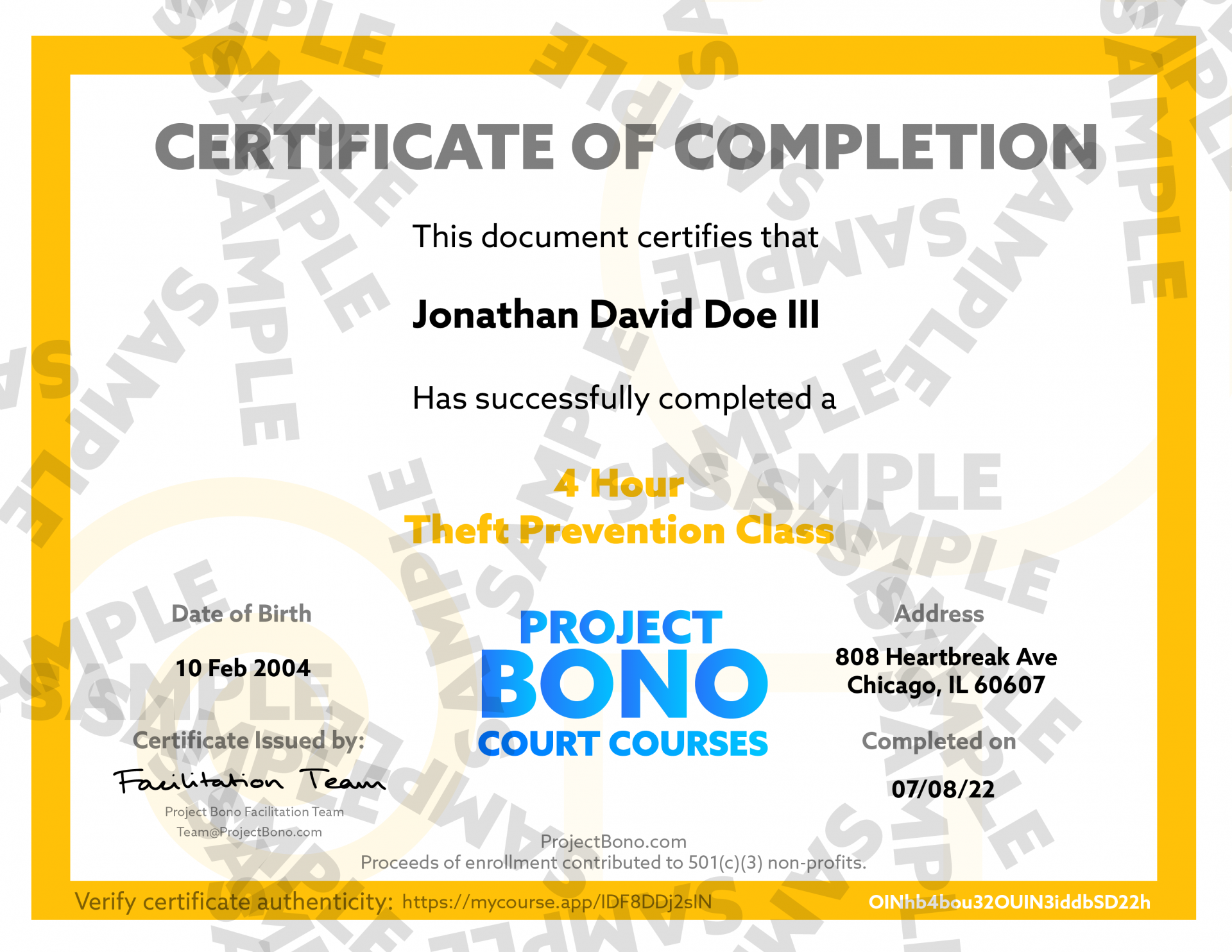
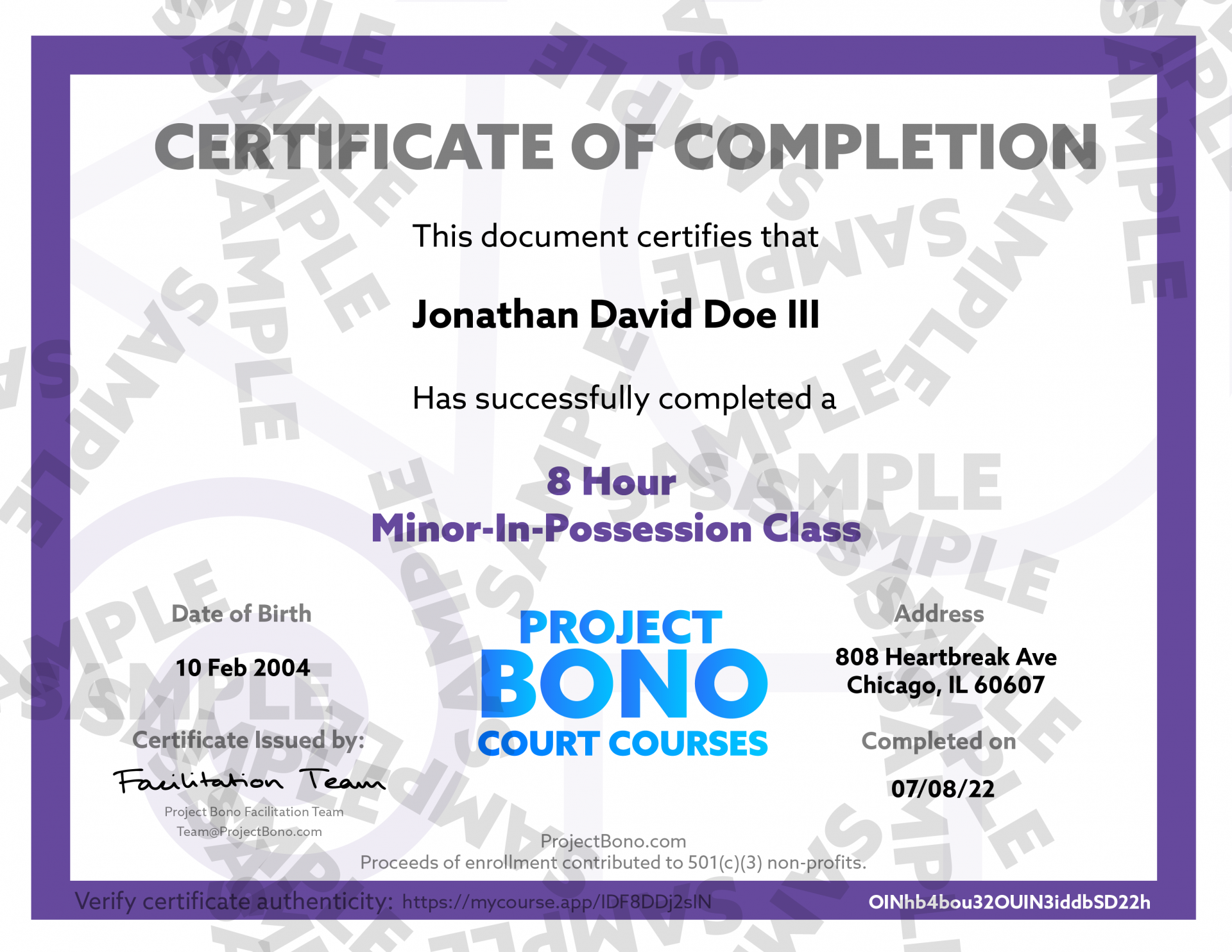
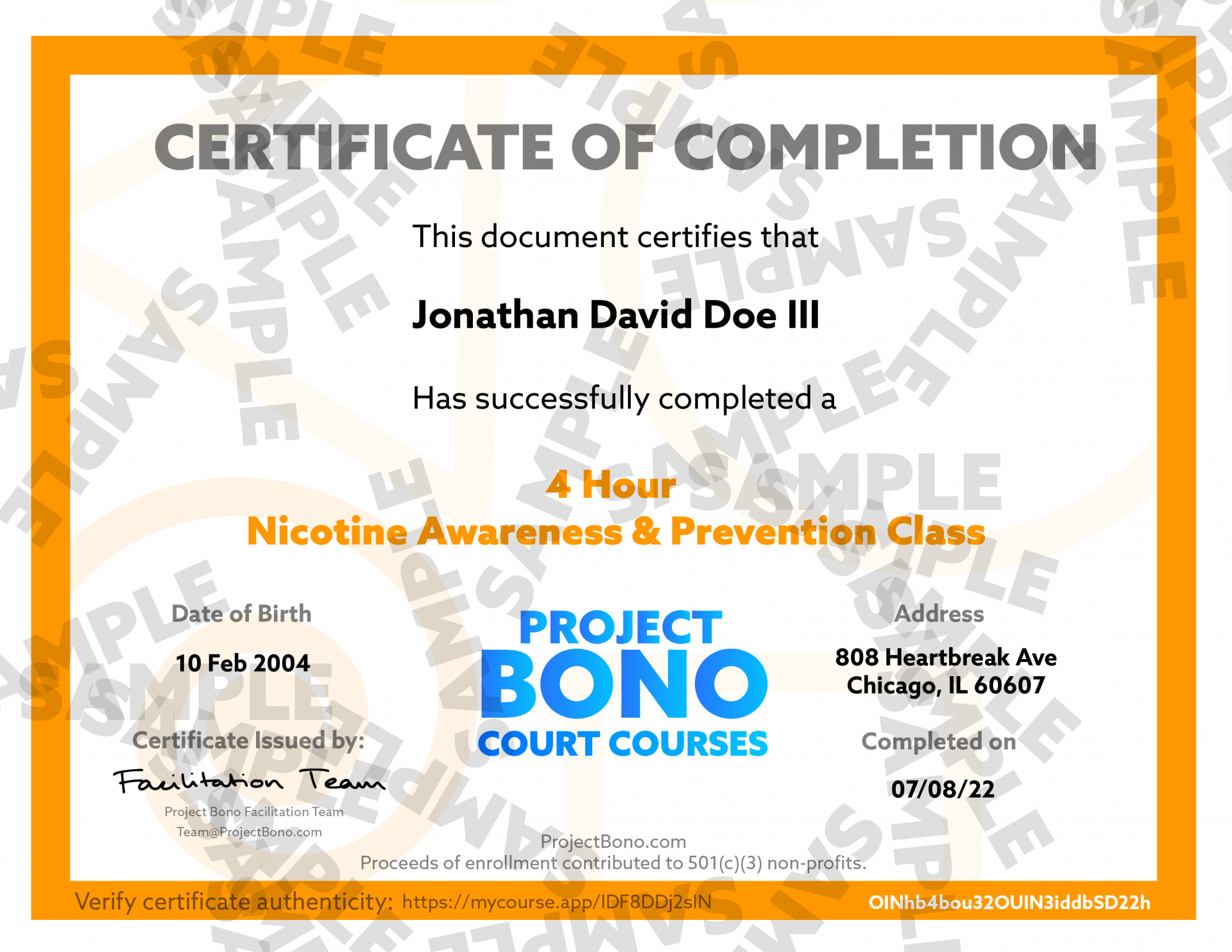
Course updates
Course contents and formatting are subject to improvements.
We are constantly monitoring current scientific and legislative data to provide you with the most accurate information within our courses. When you purchase any of our courses you are entitled to all future versions of the course.
We are constantly monitoring current scientific and legislative data to provide you with the most accurate information within our courses. When you purchase any of our courses you are entitled to all future versions of the course.
PrintableHandouts
Download and print PDF handouts to easily direct students to the correct course and start assigning!
How does Project Bono work?
Project Bono offers correctional education programs that aim to educate first-time and repeat offenders about the risks associated with substance abuse and harmful behaviors.
As you progress through our courses, you'll have access to various forms of media, including videos, to help you understand the material.
Once you've completed the course and met the time requirement, you'll receive a certificate of completion that you can share with your court, school, or employer.
As you progress through our courses, you'll have access to various forms of media, including videos, to help you understand the material.
Once you've completed the course and met the time requirement, you'll receive a certificate of completion that you can share with your court, school, or employer.
One thing that makes Project Bono stand out is that we donate 25% of enrollment proceeds back to the communities that assign our programs.
This means that by assigning our programs, not only are individuals learning valuable life skills and building awareness, but they are also enriching the communities that assign our programs.
This means that by assigning our programs, not only are individuals learning valuable life skills and building awareness, but they are also enriching the communities that assign our programs.
What Programs are offered?
We cover a wide range of topics including Drugs & Alcohol Awareness, Cannabis Education, Minor in Possession (MIP), Nicotine Prevention, Bullying Prevention, Anger Management, Theft Prevention, Truancy Prevention, and more.
We continuously update our programs to reflect current research and trends in substance abuse and other harmful behaviors.
Forgot your Password?
If you forgot your password, you can reset it by clicking on the "Forgot your password?" link on the login page.
If you signed up with an existing social account and the "Forgot your password?" solution doesn't work, you may need to change your password on the existing social account.
If you signed up with an existing social account and the "Forgot your password?" solution doesn't work, you may need to change your password on the existing social account.
Can I take a course on my phone?
Yes!
All of our courses are accessible across any device with a web browser.
All of our courses are accessible across any device with a web browser.
Can I take a course on my phone?
Project Bono is accessible to anyone with a web browser (such as Google Chrome, Safari, Microsoft Edge, etc.), and a stable internet connection. Whether you choose to participate from a desktop computer, laptop, tablet, or smartphone, you should be able to access our programs with ease.
Our website is designed to adjust to your device's screen size and resolution, making it easy to start a course on one device and pick up where you left off on another. If you have any questions about the technology required to participate in our programs, our support team is always here to help.
Our website is designed to adjust to your device's screen size and resolution, making it easy to start a course on one device and pick up where you left off on another. If you have any questions about the technology required to participate in our programs, our support team is always here to help.
What if my certificate is not accepted?
If your certificate of completion is not accepted by a member of the court, counselor, employer, administrator, or any other occupational, educational, or legal assigner, please contact us.
Our certificates come backed with a 30-day acceptance guarantee. If your certificate is not accepted for any reason, please provide us with documented proof of rejection, such as an email or written statement from the assigner.
We always recommend contacting your issuing party before purchasing any of our courses to confirm they will accept your certificate. Please note that refunds in these cases are only granted within the 30-day guarantee period.
How do I request a refund?
If you need to request a refund for any reason, including if your certificate of completion is not accepted by your assignor, you can do so by sending us an email at team@projectbono.com.
To enact our acceptance guarantee, please include in your email a written proof of decline from the assignor that includes a way of reaching them. If the request is within 30 days of your purchase and meets the criteria of our acceptance guarantee, we will process your refund promptly.
Please note that refunds that don't qualify for the acceptance guarantee, such as those requested outside of the 30-day window or for reasons other than non-acceptance by your assignor, are reviewed and issued on a case-by-case basis.
If you have any questions or concerns about requesting a refund, please don't hesitate to contact our customer support team at team@projectbono.com.
Am I able to pause the course?
Yes, participants are able to pause the course and continue at any time, on any device. Our platform is designed to save your progress consistently while you participate in the course, so you can pick up right where you left off. Whether you need to take a break for a few hours or a few days, you can rest assured that your progress will be saved.
We want you to get the most out of our courses and achieve your goals, and that means being able to learn at your own pace and on your own schedule. So go ahead and take a break if you need to - we'll be here when you're ready to continue.
How long does it take to complete a course?
The time it takes to complete a course varies depending on the time requirement you choose. When you enroll in a course, the time requirement will be clearly stated on the course page, along with an estimated completion time based on that requirement.
If you're unsure about which time requirement to choose or have any other questions about course completion time, you should reach out to your assigning party.
What does the certificate look like?
Every certificate generated by Project Bono includes the following information: course title and time requirement, student's name, birth date, address, date of completion, and certificate verification link. This information is unique to each certificate and cannot be duplicated or edited.
We offer certificates in PDF format because it's the most efficient way to send documents over email, while also reducing paper, ink, energy, transportation, and overall costs required to mail a physical copy.
Remember, it's important to submit your certificate of completion to your assignor as soon as possible to avoid any complications. If you have any questions or issues, please contact our support team for assistance.
Hollup.
Who are You?
Acceptance Guarantee
Enhance your assurance with our 30-Day Acceptance Guarantee.
Whenever you enroll in a Project Bono program, you have the peace of mind knowing that our certificate is backed by our Acceptance Guarantee. If your certificate isn't embraced by the assigning entity, we've got you covered.
Simply provide us with a proof of decline, and we'll handle the rest.
Simply provide us with a proof of decline, and we'll handle the rest.
◊ Acceptance Guarantee: Offer is only valid for 30 days from the date of certificate issuance and is available to participants within the U.S. The guarantee is subject to validation of the proof of non-acceptance provided by the enrollee. For detailed information regarding our policy, see support.projectbono.com/acceptance-guarantee.